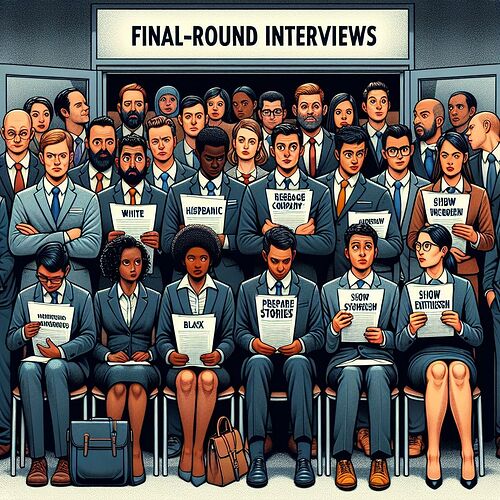Preparing for a final-round interview can be both exciting and nerve-wracking. To help you navigate this crucial stage, here are ten tips that will give you the confidence to succeed:
- Research the Company Thoroughly
- Review Your Previous Interviews
- Prepare for Behavioral Questions
- Dress Appropriately
- Be Ready to Discuss Salary and Benefits
- Ask Insightful Questions
- Showcase Your Enthusiasm
- Practice Your Body Language
- Prepare Your References
- Follow Up with a Thank-You Note
Before your final-round interview, ensure you have a deep understanding of the company’s mission, values, culture, and recent achievements.
Example: If you're interviewing at a tech company, familiarize yourself with their latest product launches, technological advancements, and industry standing.
Take time to go over the questions and feedback from your earlier interviews. This will help you identify areas for improvement and prepare for any follow-up questions.
Example: If you were asked about your problem-solving skills in a previous round, prepare to discuss a different example or elaborate further on the one you provided.
Final-round interviews often include behavioral questions to assess how you handle various situations. Use the STAR method (Situation, Task, Action, Result) to structure your responses.
Example: "Tell me about a time when you had to manage a team under a tight deadline." Structure your answer to highlight the situation, your task, the actions you took, and the results achieved.
Even if the company has a casual dress code, it's better to err on the side of formality for your final interview. This shows respect and seriousness about the opportunity.
Example: Opt for business casual attire unless explicitly told otherwise. A blazer and dress pants or a professional dress can make a good impression.
Final interviews often touch on salary expectations and benefits. Research industry standards and be prepared to discuss your requirements confidently.
Example: "Based on my research and experience, I believe a salary range of $60,000 to $70,000 is appropriate for this role."
Prepare thoughtful questions that demonstrate your interest in the role and company. This can also help you gauge if the company is a good fit for you.
Example: "Can you tell me more about the team I will be working with and the projects we will be focusing on in the next six months?"
Express your excitement about the role and the company. Enthusiasm can be contagious and leave a positive impression on your interviewers.
Example: "I am truly excited about the possibility of joining your team and contributing to your innovative projects."
Your body language can communicate confidence and professionalism. Practice maintaining eye contact, offering a firm handshake, and sitting up straight.
Example: Avoid crossing your arms or fidgeting, as these can be perceived as signs of nervousness or disinterest.
Have a list of professional references ready in case your interviewer asks for them. Ensure your references are aware and prepared to speak on your behalf.
Example: "I have included my previous manager and a team lead from my last project as references. They can provide insights into my work ethic and skills."
After your interview, send a personalized thank-you note to express your gratitude and reiterate your interest in the position.
Example: "Thank you for the opportunity to discuss my potential role at your company. I am very excited about the possibility of contributing to your team."
By following these tips, you'll be well-prepared to make a lasting impression in your final-round interview. Good luck!
Did I miss anything? Add your comments below!
